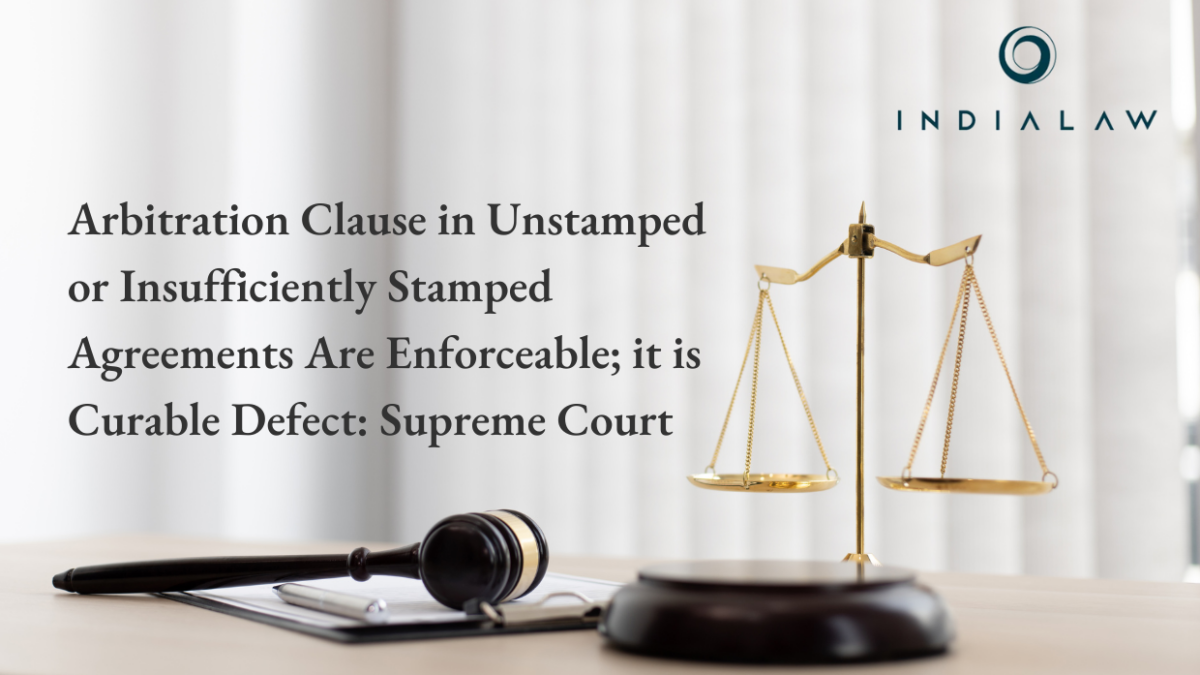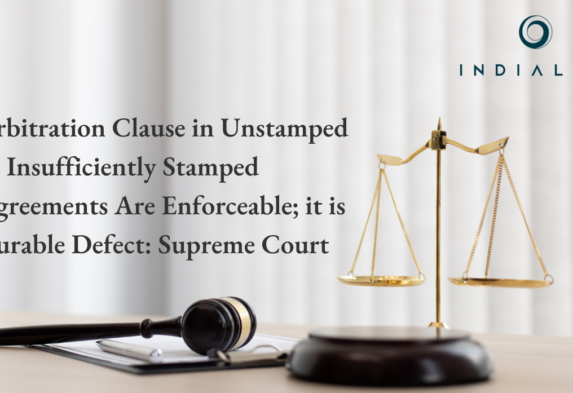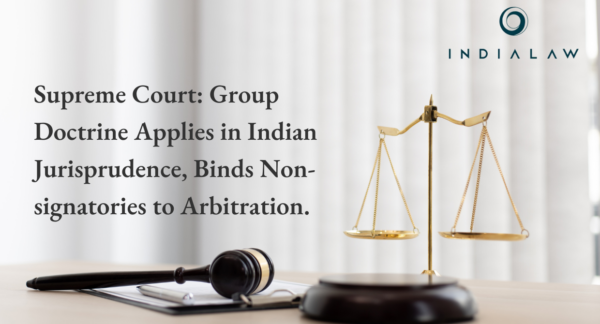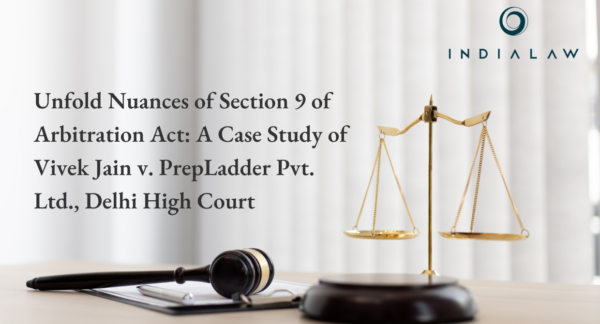Arbitration Clause in Unstamped or Insufficiently Stamped Agreements Are Enforceable; it is Curable Defect: Supreme Court


The Supreme Court (“SC”) recently, In Re Interplay between Arbitration Agreements under the Arbitration and Conciliation Act, 1996 And the Indian Stamp Act, 1899[i] held that arbitration clauses provided under the agreements that are insufficiently or inadequately stamped are enforceable.
The SC further clarified that the defect of insufficient or non-stamping is a curable defect thus, it shall not render an agreement void ab initio or unenforceable, but it would be inadmissible in evidence.
The SC bench comprisingofChief Justice of India (CJI) DY Chandrachud, Justice Sanjay Kishan Kaul, Justice Sanjiv Khanna, Justice B R Gavai, Justice Surya Kant, Justice JB Pardiwala, and Justice Manoj Misra, overruled the decision of 5-judges bench in M/s. N.N. Global Mercantile Pvt. Ltd. v. M/s. Indo Unique Flame Ltd. And Ors.[ii] which held that unstamped arbitration agreements are invalid therefore not enforceable in law.
Table of Contents
Brief history and evolution of the Petition
Back in 2011 and thereafter much later in 2020 [N N Global Case (supra)], it was held by the SC that unstamped arbitration agreements are unenforceable in law. Subsequently, as in the year 2021, a three-judge bench of the SC disagreed with the previous rulings, the said issue was referred to a five-judge Constitution Bench.
Placing reliance on SMS Tea Estates Private Limited v. Chandmari Tea Company Private Limited[iii], in 2023, the 5-judges bench[iv] ruled with a 3:2 majority that the agreements not stamped were void and unenforceable. It was concluded that as an arbitration clause is inseparable from the principal contract, thus, if the stamp duty was unpaid on the principal contract, then the arbitration clause would have no validity.
In view of the aforesaid enigmatic position, a curative petition came to be filed before the SC challenging the judgment passed in Bhaskar Raju and Brothers and Anr v. Dharmaratnakara Rai Bahadur Arcot Narainswamy Mudaliar Chattram & Other Charities and Ors.[v] The bench reconsidered the matter due to its “larger ramifications and consequences”.
Contentions of the Petitioner
It was argued that an arbitration agreement’s existence and its validity are two different concepts. On the basis of this, it was contended that the scope of Section 11 of the Act is to examine the existence of the agreement and not to ascertain its validity.
In view of the principle of kompetenz-kompetenz enshrined under section 16 of the Act, it was further contended that the validity of an agreement including the issue of stamping shall be determined by an arbitrator.
Contentions of the respondents
The respondents contended that decisions in N N Global 2 (supra) was correct and was in line with the consistent position adopted by this Court in SMS Tea Estates (supra) which ought not to be disturbed.
Observations of the SC
While discussing the essence of difference between the admissibility and voidness of an agreement, the SC stated that as per Section 2(g) of the Contract Act an agreement not enforceable by law is void. Similarly, an agreement can be valid in law but inadmissible as evidence. When stating that an agreement is void the same will be unenforceable in law but when it is unstamped or not duly stamped it cannot be considered as void ab initio.
The Court discussed Section 35 of the Stamp Act, and stresses that it clearly states, “No instrument chargeable with duty shall be admitted in evidence,” that is focusing on admissibility of such an instrument in legal proceedings. The expression “admitted in evidence” mentioned in the said provision highlights the impact of stamp duty on instruments, whether the same will be admissible or not.
Section 42(2) of the Stamp Act says that an instrument, for which stamp duty is duly paid and endorsed will be deemed “admissible in evidence”.
Conclusion
The aforesaid observation of the SC makes it clear that non-payment or inadequate payment of stamp duty will not render the instrument invalid, though it shall be inadmissible in law. The Stamp Act does not say that unstamped or insufficiently stamped documents are void. It is a curable defect, and the Stamp Act provides a structured procedure to rectify this defect.
The SC concluded that “Section 2(j) is not attracted when an instrument is rendered inadmissible under Section 35 of the Stamp Act. The effect of the latter is not to render an unstamped agreement unenforceable. If it was unenforceable, it would imply that it was void“.
Justice Sanjiv Khanna separately wrote a concurring decision explaining that unstamped agreements are not rendered void or void ab initio.
CJI Chandrachud concluded that:
- Agreements that are not duly stamped or unstamped, the same are not void ab initio or unenforceable in law, though such documents are inadmissible in evidence.
- If a document is unstamped or not duly stamped, it is a curable defect.
- Under Sections 8 or 11 of the Act, the Court cannot determine the issue of stamping of a document. Under this, the Court needs to examine the existence of the agreement.
- Objection regarding arbitration agreement falls under the domain of the arbitral tribunal.
- The decision in the cases of NN Global and SMS Tea Estates is overruled.
CJI pointed out that the objective of the Act is to reduce the supervisory role of courts in arbitration matters. If the court starts examining the issue of stamping under Section 8 and 11 of the Act, its objective will be defeated.
The SC through its recent judgment has cleared the roadblock to the future of arbitration-based disputes. The ruling brings relief to parties entering into commercial agreements, contracts and due to certain lacunas like insufficient stamping, the very existence of agreements has been questioned time and again.
[i] Curative Pet(C) No. 44/2023 In R.P.(C) No. 704/2021 In C.A. No. 1599/2020, 2023 LiveLaw (SC) 1049
[ii] 2021 SCC OnLine SC 13
[iii] (2011) 14 SCC 66
[iv] N.N. Global Mercantile Pvt. Ltd. v. Indo Unique Flame Ltd., 2023 SCC OnLine SC 495
[v] 2014 SCC OnLine Kar 8629




